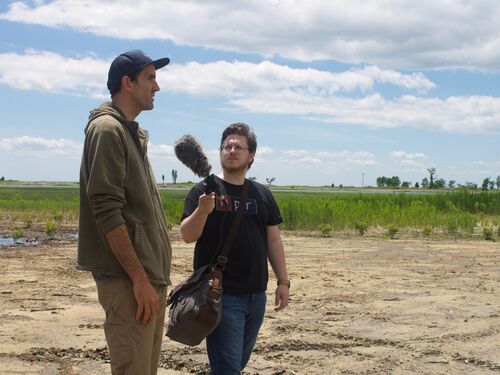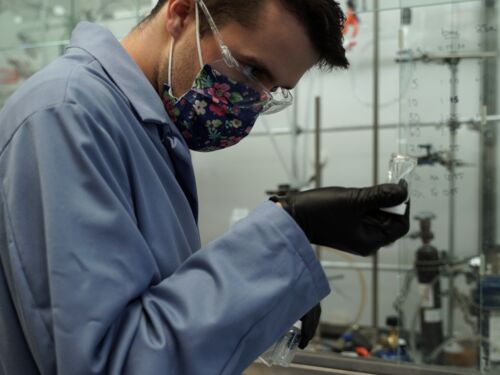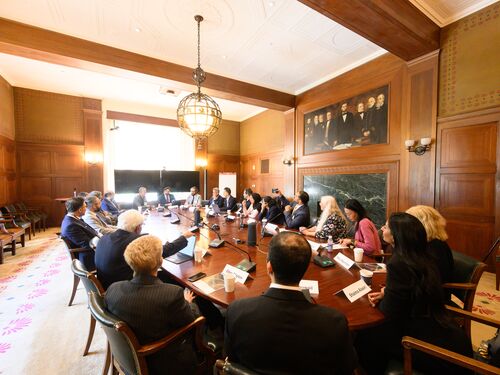Supporting Science in Africa’s Pandemic Response
Feature Story
By Sara Frueh
Last update June 3, 2021
The National Academies join partnerships to spur the use of evidence in policy
The COVID-19 pandemic has presented a relatively rare situation in which the entire globe is grappling with the same crisis at the same time, albeit with widely varying approaches, resource levels, and political structures.
That shared struggle has galvanized new partnerships and revived past ones across organizations and national boundaries, as scientists, health care workers, and policymakers work to respond to the pandemic.
One such collaboration, the Partnership for Evidence-Based Response to COVID-19 (PERC), aims to bring evidence to the fight against the disease across Africa. The partnership tracks and analyzes data on COVID-19 in individual African Union Member States, and also assesses overall trends and needs on the continent.
A recent analysis, for example, found that limitations in testing capacity and surveillance are likely masking the true severity of COVID-19 on the African continent. It called on the global community to step up by increasing the production of vaccines, ensuring their equitable allocation, and rapidly sharing technology and expertise to allow their regional production in Africa. Equally important are public health and social measures to limit the spread of the virus such as handwashing, masks, and physical distancing, the report said.
As a partner in PERC, the U.S. National Academies of Sciences, Engineering, and Medicine oversee peer review of the organization’s reports to help ensure their scientific quality.
Joining the partnership was an opportunity not only to help fight the pandemic but also to support international scientific collaboration during a challenging time for such efforts, says Negin Sobhani, who directs the National Academies’ activities in the partnership.
“Particularly when COVID started last year, both politically and domestically we were very focused on America’s situation because things were really bad in America,” said Sobhani. “And then America withdrew from the World Health Organization, and there was more and more isolationism happening. Some of it may be natural in a pandemic, where you want to focus on keeping your own citizens healthy and alive. But there was also this concern from lots of internationally focused experts and entities that America needed to stay engaged internationally.”
International partnerships are also helping PERC’s findings influence policy. The U.S. National Academies and science academies across Africa are working together to get PERC’s reports to policymakers and other people who can use them to fight the pandemic through evidence-based policies.
Ensuring high-quality science
PERC has released reports on the COVID-19 pandemic in the 19 member nations of the African Union, each of which includes statistics and trends on the incidence of COVID-19, deaths from the disease, and social and economic impacts. Each report also includes the results of a survey that asked citizens about the degree to which they support and follow public health and safety measures — such as mask requirements and restrictions on gatherings — and how much they trust the institutions handling the pandemic.
The reports reveal some stark differences among countries. For example, the late-February incidence rate of COVID-19 was only 30 for every 100,000 people in the Democratic Republic of the Congo, compared to 2,600 per 100,000 in South Africa. Willingness to be vaccinated also varies: Only one-third of Tunisians surveyed said that they would take a vaccine when it was available, compared with over 90 percent of respondents in Morocco.
Each of PERC’s reports must undergo peer review to ensure that the content is based on the evidence. The National Academies are helping to provide experts in a wide range of disciplines, including epidemiology, medicine, public health, biostatistics, the social sciences, and bioethics, among other fields.
“It’s a great function for the U.S. Academies,” said Alan Leshner, former CEO of the American Association for the Advancement of Science, who served as a peer reviewer for several of the PERC reports. “The Academies have expertise in virtually anything related to science and can bring that to bear.”
Leshner, who has co-chaired several U.S. National Academies studies, brought his expertise in science communication and science policy to his review of several PERC reports. “What I saw as my role was to try to make sure that these documents were understandable, that they were credible, that they were consistent — and that they didn’t have so much information that no one would ever read them.”
Building links between evidence and policy
Getting PERC’s reports read — and acted upon — after they’re finished is the next challenge. Science academies across Africa, in partnership with the U.S. National Academies, are working to get the reports into the hands of policymakers and other decision-makers who can use their insights to fight the pandemic.
Typically, the African science academies use the PERC reports as a launching pad for in-depth conversations about COVID with stakeholders in their nations’ governments, says Patricia Cuff of the U.S. National Academies, who works on partnership activities with the African science academies. After these discussions, the African academies often develop reports with specific recommendations for how to address aspects of the pandemic and disseminate them to the policymakers.
The relationships established now between the science academies and policymakers may prove helpful beyond the pandemic, in addressing other challenges countries face. “COVID is an inflection point,” says Cuff. “At an inflection point, people are listening, they want help, and they want guidance. There’s an opportunity here to develop relationships that will go beyond COVID.”
The government of the southern African nation of Eswatini, for example, turned to its science academy for policy guidance around COVID-19, realized how helpful it could be, and now plan to tap its expertise for issues beyond the pandemic, said Cuff.
But building these links between science and policy is not easy, even for one of the largest and most established academies on the continent. Himla Soodyall, executive officer of the Academy of Science of South Africa, says that one of her priorities is to try to understand better ways to get on policymakers’ radar.
“In a country like South Africa, where there are so many challenges — particularly poverty and inequalities of the past — if you do something too academic and don’t really contextualize how it all fits into the priority areas of poverty, unemployment, and inequality, you don’t really come onto the radar, capturing the eyes of people in power.”
Soodyall wants to improve science engagement and communication, not just with policymakers but with people in general — “to take science out of the ivory towers and into the minds and psyches of individuals” in ways that help them ask questions and make informed decisions in daily life.
Exchanging ideas and sparking innovation
The U.S. National Academies’ recent work with PERC and African science academies around COVID-19 builds on a long history of engagement. From 2004 to 2014, the U.S. Academies’ African Science Academy Development Initiative worked with African academies to build their capacity to inform policy. Having those relationships made partnering on scientific responses to the pandemic much easier.
“What happens in Africa affects us, and what happens here affects Africa,” said Cuff. “Having those voices is so important — to be able to have those relationships in place when a crisis hits, when we need something, or when they need you. You’ve got a wider lens to do outreach.”
The U.S. can also learn from Africa, said Sobhani, pointing to countries in West Africa that fared well in managing COVID because of their prior experience dealing with Ebola. “They knew how to shut down and make sure that something that is highly contagious doesn’t take off and destroy the population.”
That learning extends to other challenges common to both the U.S. and Africa, says Cuff. “We have so much to learn from those who are in Africa working in rural and underserved communities. We have rural and underserved communities in the United States. We can learn from what they’re doing — from their health systems — on a shoestring budget, and we can potentially adapt those resources to our situation, but we need that diversity of conversation to spark those ideas.”
The value of these partnerships is that they offer both partners a very different lens through which to view the world, which can yield deeper, more insightful ideas, Cuff says. “That lens triggers ideas in other people, and that’s where the real innovation comes.”
Learn more about PERC and the National Academies’ involvement in the partnership, and register for a June 8 webinar where representatives from African science academies will discuss their work in COVID-19 response.
More like this
Discover
Events
Right Now & Next Up
Stay in the loop with can’t-miss sessions, live events, and activities happening over the next two days.
NAS Building Guided Tours Available!
Participate in a one-hour guided tour of the historic National Academy of Sciences building, highlighting its distinctive architecture, renowned artwork, and the intersection of art, science, and culture.




